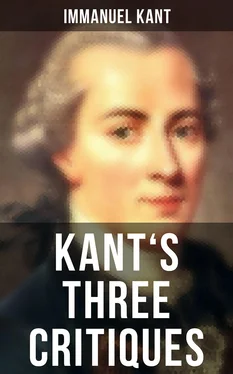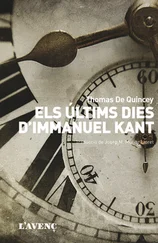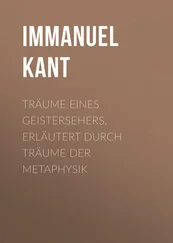I know no investigations more necessary for a full insight into the nature of the faculty which we call understanding, and at the same time for the determination of the rules and limits of its use, than those undertaken in the second chapter of the “Transcendental Analytic,” under the title of “Deduction of the Pure Conceptions of the Understanding”; and they have also cost me by far the greatest labour — labour which, I hope, will not remain uncompensated. The view there taken, which goes somewhat deeply into the subject, has two sides, The one relates to the objects of the pure understanding, and is intended to demonstrate and to render comprehensible the objective validity of its a priori conceptions; and it forms for this reason an essential part of the Critique. The other considers the pure understanding itself, its possibility and its powers of cognition — that is, from a subjective point of view; and, although this exposition is of great importance, it does not belong essentially to the main purpose of the work, because the grand question is what and how much can reason and understanding, apart from experience, cognize, and not, how is the faculty of thought itself possible? As the latter is an inquiry into the cause of a given effect, and has thus in it some semblance of an hypothesis (although, as I shall show on another occasion, this is really not the fact), it would seem that, in the present instance, I had allowed myself to enounce a mere opinion, and that the reader must therefore be at liberty to hold a different opinion. But I beg to remind him that, if my subjective deduction does not produce in his mind the conviction of its certitude at which I aimed, the objective deduction, with which alone the present work is properly concerned, is in every respect satisfactory.
As regards clearness, the reader has a right to demand, in the first place, discursive or logical clearness, that is, on the basis of conceptions, and, secondly, intuitive or aesthetic clearness, by means of intuitions, that is, by examples or other modes of illustration in concreto. I have done what I could for the first kind of intelligibility. This was essential to my purpose; and it thus became the accidental cause of my inability to do complete justice to the second requirement. I have been almost always at a loss, during the progress of this work, how to settle this question. Examples and illustrations always appeared to me necessary, and, in the first sketch of the Critique, naturally fell into their proper places. But I very soon became aware of the magnitude of my task, and the numerous problems with which I should be engaged; and, as I perceived that this critical investigation would, even if delivered in the driest scholastic manner, be far from being brief, I found it unadvisable to enlarge it still more with examples and explanations, which are necessary only from a popular point of view. I was induced to take this course from the consideration also that the present work is not intended for popular use, that those devoted to science do not require such helps, although they are always acceptable, and that they would have materially interfered with my present purpose. Abbe Terrasson remarks with great justice that, if we estimate the size of a work, not from the number of its pages, but from the time which we require to make ourselves master of it, it may be said of many a book that it would be much shorter, if it were not so short. On the other hand, as regards the comprehensibility of a system of speculative cognition, connected under a single principle, we may say with equal justice: many a book would have been much clearer, if it had not been intended to be so very clear. For explanations and examples, and other helps to intelligibility, aid us in the comprehension of parts, but they distract the attention, dissipate the mental power of the reader, and stand in the way of his forming a clear conception of the whole; as he cannot attain soon enough to a survey of the system, and the colouring and embellishments bestowed upon it prevent his observing its articulation or organization — which is the most important consideration with him, when he comes to judge of its unity and stability.
The reader must naturally have a strong inducement to co-operate with the present author, if he has formed the intention of erecting a complete and solid edifice of metaphysical science, according to the plan now laid before him. Metaphysics, as here represented, is the only science which admits of completion — and with little labour, if it is united, in a short time; so that nothing will be left to future generations except the task of illustrating and applying it didactically. For this science is nothing more than the inventory of all that is given us by pure reason, systematically arranged. Nothing can escape our notice; for what reason produces from itself cannot lie concealed, but must be brought to the light by reason itself, so soon as we have discovered the common principle of the ideas we seek. The perfect unity of this kind of cognitions, which are based upon pure conceptions, and uninfluenced by any empirical element, or any peculiar intuition leading to determinate experience, renders this completeness not only practicable, but also necessary.
Tecum habita, et noris quam sit tibi curta supellex. 3
Such a system of pure speculative reason I hope to be able to publish under the title of Metaphysic of Nature 4 . The content of this work (which will not be half so long) will be very much richer than that of the present Critique, which has to discover the sources of this cognition and expose the conditions of its possibility, and at the same time to clear and level a fit foundation for the scientific edifice. In the present work, I look for the patient hearing and the impartiality of a judge; in the other, for the good-will and assistance of a co-labourer. For, however complete the list of principles for this system may be in the Critique, the correctness of the system requires that no deduced conceptions should be absent. These cannot be presented a priori , but must be gradually discovered; and, while the synthesis of conceptions has been fully exhausted in the Critique, it is necessary that, in the proposed work, the same should be the case with their analysis. But this will be rather an amusement than a labour.
1 Ovid, Metamorphoses. [xiii, “But late on the pinnacle of fame, strong in my many sons, now exiled, penniless.”]
2 We very often hear complaints of the shallowness of the present age, and of the decay of profound science. But I do not think that those which rest upon a secure foundation, such as mathematics, physical science, etc., in the least deserve this reproach, but that they rather maintain their ancient fame, and in the latter case, indeed, far surpass it. The same would be the case with the other kinds of cognition, if their principles were but firmly established. In the absence of this security, indifference, doubt, and finally, severe criticism are rather signs of a profound habit of thought. Our age is the age of criticism, to which everything must be subjected. The sacredness of religion, and the authority of legislation, are by many regarded as grounds of exemption from the examination of this tribunal. But, if they are exempted, they become the subjects of just suspicion, and cannot lay claim to sincere respect, which reason accords only to that which has stood the test of a free and public examination.
3 Persius. Satirae iv. 52. “Dwell with yourself, and you will know how short your household stuff is.”
4 In contradistinction to the Metaphysic of Ethics. This work was never published.
Preface to the Second Edition, 1787
Table of Contents
Whether the treatment of that portion of our knowledge which lies within the province of pure reason advances with that undeviating certainty which characterizes the progress of science, we shall be at no loss to determine. If we find those who are engaged in metaphysical pursuits, unable to come to an understanding as to the method which they ought to follow; if we find them, after the most elaborate preparations, invariably brought to a stand before the goal is reached, and compelled to retrace their steps and strike into fresh paths, we may then feel quite sure that they are far from having attained to the certainty of scientific progress and may rather be said to be merely groping about in the dark. In these circumstances we shall render an important service to reason if we succeed in simply indicating the path along which it must travel, in order to arrive at any results — even if it should be found necessary to abandon many of those aims which, without reflection, have been proposed for its attainment.
Читать дальше












